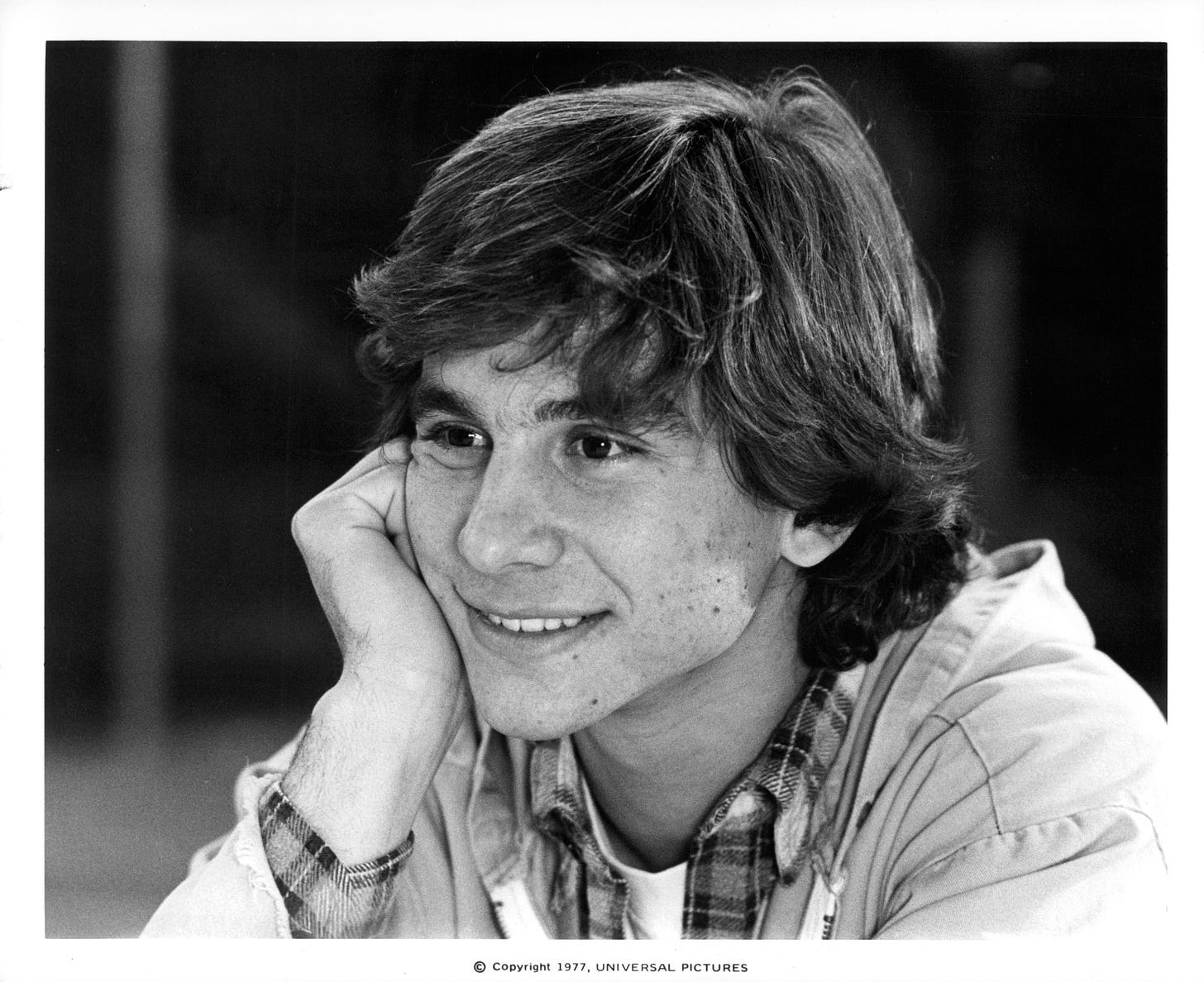In second grade a kid taught me a joke. Either Billy Skinner or Jerry Boyer. It went: This man’s with a whore, and he’s eating her out. He comes across a chunk of carrot. He shrugs and eats it. He comes across some green peas that give him pause. He eats those. When he comes across a chunk of celery, he stops and asks the whore, “Are you sick?”
And the whore tells him, “No, but I think the guy before you was.”
Yeah, right. I dare you to share this one. And not just the joke.
Not one word made sense to me. I was seven1. But when I repeated those nonsense words in the exact right order all the grown-ups at the local barber shop busted out laughing. Kids schooled me to recite magic nonsense about Jews and Black people. One meaningless magic spell talked about how fags passed gas2. Not that I knew any Jews or Blacks. Much less what a fag even was. Our town counted one Black guy. Our football coach. But I didn’t even know he was Black.
What I knew was: The right words in the right order made people laugh.
The same went for prayers. Prayers got you stuff. At Catholic Catechism (CCD) the first kid to recite The Apostles’ Creed or The Nicene Creed got to step up to the nun’s desk and choose a prize. Parishioners had coughed up these items. China statues of saints mostly. Golden rosary beads. Stuff good for nothing except giving to your grandmother. The prizes weren’t the point. This was a race.
The magic words, prayers or jokes, they didn’t have to make sense. They got you a reward if you could say them the perfect way. Then, along came the television program Night Gallery3.
The same went for prayers. Prayers got you stuff.
More scary than Dark Shadows, it came on Wednesday nights at some after-bedtime hour. Each Night Gallery consisted of three stories4 On Thursday morning us kids pestered our mom to recount every detail of the show. They might be too scary to watch but we could still get a lightweight horror buzz by hearing the stories aloud. Over breakfast mom had to dredge up – in perfect order – every plot point, every set-up, flashback, reversal, flash forward, stressor element, ironic twist, lull, sudden reveal, foreshadowing detail, pay-off and comic denouement5. Unlike jokes or prayers, these made sense, and our reward was a full-body shudder of dread.
Along came our parents’ divorce, and on joint-custody days our dad had no idea how to pass the time with kids so he took us to the movies. Think Bonnie and Clyde, Taxi Driver, and Midnight Cowboy. Back at home mom would sit us down and make us fess up about every naked lady, every blood-spurting gunshot wound, and every cuss word. All ammunition she could use against dad.
At sixteen I ushered that same tri-plex theater where as children we’d watched Carrie White get her first period. A strange job, to say the least6. In time I ran the projectors. When a film broke a high-pitched alarm would blare, and I’d bolt up a long flight of stairs to the booth with eight hundred angry moviegoers cursing me from their seats. To this day I wake with that alarm blaring in my dreams and throw myself out of bed ready to make a tape splice and restart a projector.
A confession: My younger sister and I once sneaked a tape recorder into a showing of Star Wars and juggled cassettes so we could pirate the soundtrack and listen to it at home. Now I was the usher Nazi who once caught some nuclear engineers as they tried to tape record The China Syndrome. The red light on their machine gave them away. They protested that the Jane Fonda movie was junk science, and that they needed a tape in order to debunk it. The one-hundred-and-twenty-pound jack-booted thug that I was, I threw them out on their collective ear.
Double features were still a thing. “A stud and a dud,” the booking agent called them, meaning a first-run film yoked to an older rerun. Don’t get me wrong, some reruns I loved. The Good-Bye Girl and The Little Girl Who Lived Down the Lane, for example. Others played to an acre of empty seats7.
To watch Bingo Long and the Traveling All-Stars & Motor Kings two hundred times, start to finish. Or The Late Show three hundred times. Or The Apprenticeship of Duddy Kravitz four hundred times was to see past the magic that made people laugh or cry and see into the machine of plot. The and then and then and then and then, and how it worked8.
We all pick up on plot in different ways. A friend, the bestselling thriller writer Chelsea Cain, watched foreign-language films with her mother. Little Chelsea had to lean close as her mom whispered how every scene moved the story forward. How every action helped or hurt the characters.
The kids I ushered with, they staged The Bald Soprano at their high school. They staged The Shadow Box and all playacted they were dying. One blonde, willowy cashier left to study acting at the University of Washington. She later told everyone she’d appeared in a scene of The Changeling shot on location in Seattle. In it George C. Scott plays a music professor. He walks on stage to give a lecture, and in the reverse angle we see the auditorium is overfilled with thousands of students. They sit in the aisles. They stand twenty-deep in the fire exits. It’s a comic reveal I’ve paused and studied too many times, but in which I’ve yet been able to find my friend’s face.
Even with Organic Chemistry the next morning at 7:15 we’d work until midnight. After closing, high on Mr. Pibb, we’d sit in a large circle on the lobby carpet, all the doormen, the ushers, the cashiers, the snack bar staff and me. And we’d play a game we’d invented called “Box Office.” Until one… two… three in the morning we’d take turns adding to the plot of a movie. The first person would launch a premise, and everyone would person-by-person introduce characters, create conflict and obstacles, thwart love.
In hindsight, what’s interesting is how the game forced each of us to keep all the preceding elements in mind. It was as if we were playing poker and had to count cards, i.e. recall all the cards that had been played. To raise the stakes we had to take established events and characters and use them to ratchet up the tension in a new way. The game trained our memory and retrieval skills. Just like my favorite childhood game show Concentration.
It was fun and heady. We’d seen so many films9 so many times. We ranged in age from fifteen to nineteen10. Those nights, I had to make the bank deposit drop before I could catch three hours of sleep and still get to class. Sex workers would linger near the light of the bank’s drop box. I’d circle the block in hopes that they’d leave. They’d see me circling and stand closer to the light. And I’d be lucky to get an hour of sleep before organic chem.
And then and then and then…
In a galaxy far, far away I’d be on book tour in Dallas. A reader who worked at the grand old Adolphus Hotel would upgrade me to a suite that filled one entire floor11. That night I’d go to dinner with an aunt who offered an apology. Behind my back, she said, the whole family had called me a fool. Because I’d taken a minimum wage12 job when I could’ve worked in a warehouse for more money and better hours.
But no, I’d taken the crappy job where all I got was free popcorn and a chance to watch Alien on the big screen five hundred times. For crying out loud, where was the silly reward in that?
Fifty years later I would write all of these jokes into a short story called Knock-Knock.
Every word of the joke still sits like a toad in my head. I’ll spare you, but the punchline was “Get him, Brucie! He’s got a cherry!” I learned this joke before I’d learned to multiply or divide numbers.
I’d missed the first golden age of anthology television, the age of Playhouse 90, The Twilight Zone, and Outer Limits. An age, I found out much later in life, had been made possible by the slump in 1950s movie going. The studios had a surplus of standing sets, costumes, and props, not to mention aging movie stars who still needed work. It was this inventory of idle stuff and people that made producing widely different stories every week affordable. And even then The Twilight Zone was always outstripping its budge. No, my generation enjoyed the second wave of anthologies: Night Gallery, The Sixth Sense, and The Night Stalker.
Steven Spielberg’s directorial debut was with Joan Crawford on the pilot for Night Gallery. In the book Easy Riders Raging Bulls Spielberg says Crawford refused to walk with him on the street for fear that people would mistake him for her son.
Not to worry. We’ll cover a lot of this ground in upcoming articles about Plot: The Little Machine. Don’t get feeling swamped.
Read what follows at your own risk. Our theater’s safe was sunk into the concrete floor of the office, a kind of heavy steel pail secured under a standard combination dial sunk flush with the floor’s surface. The office was next door to the public toilets which backed up often, with the sewage finding the lowest point in the building, thus finding that safe. It would fill with watery crap so that anytime we were given damp bills and coins we worker bees knew to give them out to customers quickly, then wash our hands. This next part is even nastier. Forty years before #MeToo our company policy was to put the prettiest teenage girl on staff in the box office to sell tickets. Our boss, a middle-aged man managing a team of high school kids, claimed he could smell when a girl was menstruating. If that were the case, he’d assign her to the box office: a big glass cube exposed to the surrounding desert on two sides. He’d secretly shut off the air conditioning and turn on the heat, then claim the system was on the fritz. He’d only told the male staffers about his super power for sniffing, and he’d try to send each of us into that brutally hot glass room to “enjoy” the increasing smell. When no one would partake in his obsession he’d stand immediately behind the sweaty, busy cashier and inhale big chest-heaving breaths as he smiled a sleepy eyes-closed grin. So yeah, no, I don’t ever have to invent the creepiest shit I write.
Strange fact: As a teenage usher I was the doppelganger for an actor named John Friedrich. One frequently returning second-feature was Almost Summer in which he played a dorky teen. He was also in Thank Good It’s Friday. My boss at the theater would assign me to stand at the theater exit in my bright orange uniform blazer, and this shocked the exiting customers who assumed somehow that the actor they’d just seen was slumming at a shopping mall multiplex.
Our longest running show was Grease. It bumped from our largest to our smallest auditorium and always pulled a crowd. Other films, Rabbit Test… The Rose… The Warriors, they came and went, but Grease held on for two years. The same print, becoming scratchier and more spliced for two years! And when we finally broken down that print and shipped it off the hardcore group of Grease fans phoned in bomb threats.
The public address announcements had to be delivered in a specific format, one I can spout to this day. “Good evening, and welcome to the Columbia Center Cinema Tri-Plex. If you’re currently in line to buy tickets for the 7:15 showing of The Electric Horseman that showing is sold out. Tickets are still available for the 9:30 showing. For those of you holding tickets for the 7:00 showing of Smokey and the Bandit we will be seating that show in three minutes…”
The good news is that you and your friends have seen more films than any other generation in history. The bad news is that so has everyone else.
Damn that suite was big. It had a billiard room and its own library.
Three dollars and thirty-five cents an hour. Less than the price of an adult movie ticket at the time.









Yay! We have a shared experience. At fifteen, I took my first job at a gorgeous old single-screen called the Rio Theater (http://www.riotheatre.com/). Amazingly, the movie house is still in operation today, although it doubles as a music venue. The fey Erika and I, along with Cindy, who hated people but loved animals, and Raffi, the Armenian that smelled like Pan, ran the magical place.
Cindy worked the box office. Just like it sounds, it was a ticket office in a box. A chrome polyhedron with vents in the sides so she could breathe. It looked like a tiny spaceship set down on the mosaic-tiled entryway under the marquee.
There were time portals in the old building, like the wedge-shaped storage area behind the sign filled with movie posters and displays dating back to 1946. The projector room was a mad scientist’s lab. But the most liminal of all the secret spaces was the Cry Room—this weird little glass-fronted mini-theater hung suspended above the other 900 seats. Its original purpose was to seal mothers with their crying babies away in a soundproof booth. By 1985, this segregation was no longer practiced, so it was abandoned. Erika and I would sneak up there to watch movies, smoke pot, and make love. It was heaven.
As someone who literally lived in a movie theater (twice!), I thoroughly enjoyed this. To this day "concession girl" still goes down in history as my favorite job of all time. And what I wouldn't give to watch "Stand by Me" fifty thousand more times on the silver screen. Happy Sunday!